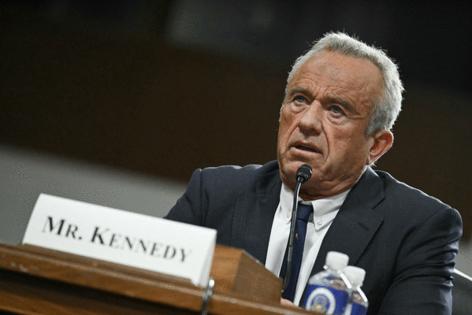Key physician groups stay silent on Kennedy nomination
Published in News & Features
WASHINGTON — The nomination of Robert F. Kennedy Jr. to lead the Department of Health and Human Services has concerned doctors and public health experts across the world who are alarmed by Kennedy’s decades-long mission to sow distrust in vaccines.
But key groups representing physicians in Washington have stayed silent in the face of what their members call a threat to public health.
The American Medical Association and the American Academy of Pediatrics — groups with tremendous influence in Washington — are among the professional societies for physicians that have not directly weighed in on Kennedy’s nomination, even after last week’s confirmation hearings in which Kennedy refused to unequivocally disavow falsehoods connecting vaccines to autism.
That frustrates physicians who have organized against the Kennedy nomination and who believe speaking out could make a difference as several Republican senators waver about whether to support the nominee because of his past comments on vaccines. The Senate Finance Committee is scheduled to vote on Kennedy’s nomination Tuesday at 10 a.m.
Doctors worry that Kennedy could further worsen vaccine uptake in the U.S., something that has been on a backslide since the pandemic, in part because of misinformation that he helped spread. They’re also worried he could mismanage a potential pandemic, which would theoretically necessitate vaccine development.
“I think they (the AMA) should stand up and say with a clear voice what we all know to be true: this guy is uniquely unqualified. This guy is scary,” said Rob Davidson, an emergency physician in Michigan and an executive director of the Committee to Protect Health Care, an organization of doctors that advocates to improve health care care for patients.
The group organized more than 18,000 physicians to sign a letter urging senators to oppose Kennedy’s nomination. Some physicians have also contacted the AMA to urge it to make a public statement, citing its “responsibility to stand up for science, evidence-based medicine, and public health.”
While Kennedy, the founder of the anti-vaccine group Children’s Health Defense, has said he won’t do anything as HHS secretary that “makes it difficult or discourages people from taking vaccines,” physicians have their doubts, including Sen. Bill Cassidy, R-La., a key vote who repeatedly pressed Kennedy on the issue last week.
Davidson said some of his physician colleagues have renounced their AMA membership.
“I had thought better of them,” Davidson said of AMA. “It’s hurting their reputation with physicians.”
The silence conflicts with the AMA’s record of work to restore trust in vaccinations and combat disinformation. In 2009, the AMA House of Delegates approved a resolution to continue efforts to communicate that vaccines do not cause autism.
And former AMA President Jesse Ehrenfeld, in a blog post last year about a lawsuit focused on social media censorship of vaccine misinformation, wrote that federal officials have a responsibility to “actively counter those voices deliberately spreading disinformation — or unintentional misinformation — about vaccines and other health issues to preserve public health and save lives.”
The AMA would not comment on the record on Kennedy’s nomination.
The organization previously endorsed Xavier Becerra, who was President Joe Biden’s HHS secretary, and Tom Price, who served as HHS secretary during part of Trump’s first term.
AMA and other organizations likely want to maintain relationships with the Trump administration and Congress as they consider policies that could have widespread impact on doctors, including prior authorization reform and physician payment policy.
Kennedy is also said to be looking at making major changes to the way Medicare pays physicians.
Groups like the American Academy of Pediatrics, which boasts a membership of 67,000 health professionals working in pediatrics, has taken a more muted approach to Kennedy’s nomination, calling it an “opportunity to share the settled science on vaccines with government leaders, policymakers and the American public.”
“We are pediatricians, not politicians,” said Susan Kressly, president of the organization, adding that the AAP generally does not weigh in on specific nominees but provides evidence-based information to senators.
“We ultimately need to make partners where we can find them to promote child health,” Kressly said.
That’s not enough, said Irwin Redlener, a pediatrician, member of AAP, and professor of pediatrics at the Albert Einstein College of Medicine in Bronx, New York.
“I think it is really quite irresponsible of them not to weigh in on this candidate. I don’t care what they usually do. This is not a usual candidate,” said Redlener, who noted that vaccinations are a “lifeblood” for pediatricians and what they do.
“I’m not saying the head of HHS has to be a doctor or scientist, but they have to not be a promoter of absurd, unscientific conspiracy theories or misinformation or misinterpretation of science.”
Not all health groups have sat on the sidelines. The American Public Health Association, which represents 25,000 public health professionals, came out against Kennedy’s nomination three days after Trump’s announcement in November, citing ongoing public health challenges, including the bird flu outbreak.
“We thought it was important, in particular due to his [Kennedy’s] opposition to good science in a variety of areas,” said Executive Director Georges Benjamin, who noted APHA has supported previous Trump nominees. “We’re very concerned people would listen, and we felt the need to weigh in early and often.”
_____
©2025 CQ-Roll Call, Inc., All Rights Reserved. Visit cqrollcall.com. Distributed by Tribune Content Agency, LLC.







Comments